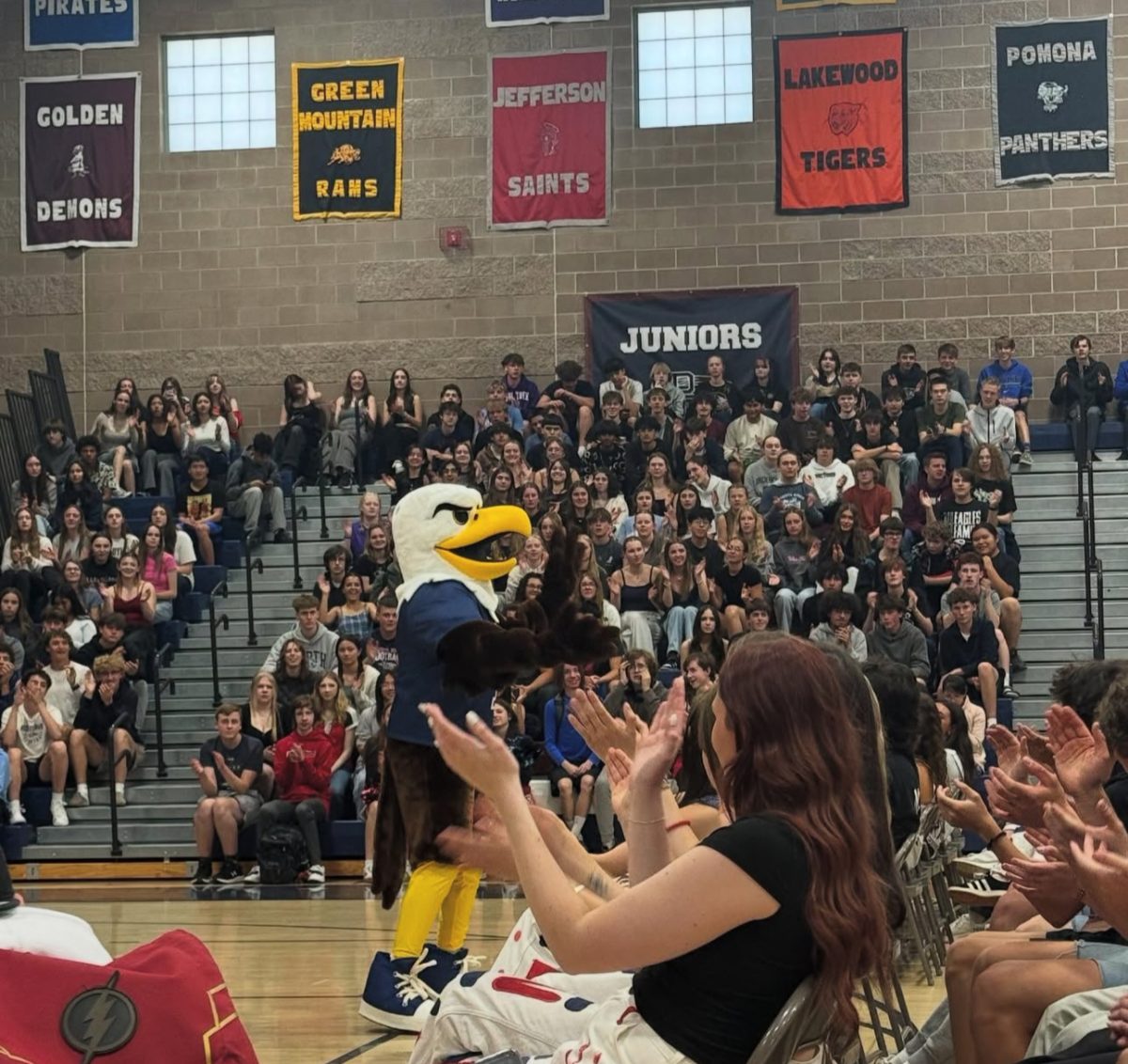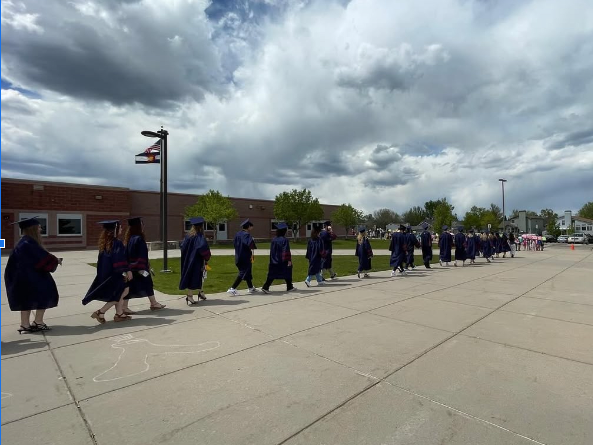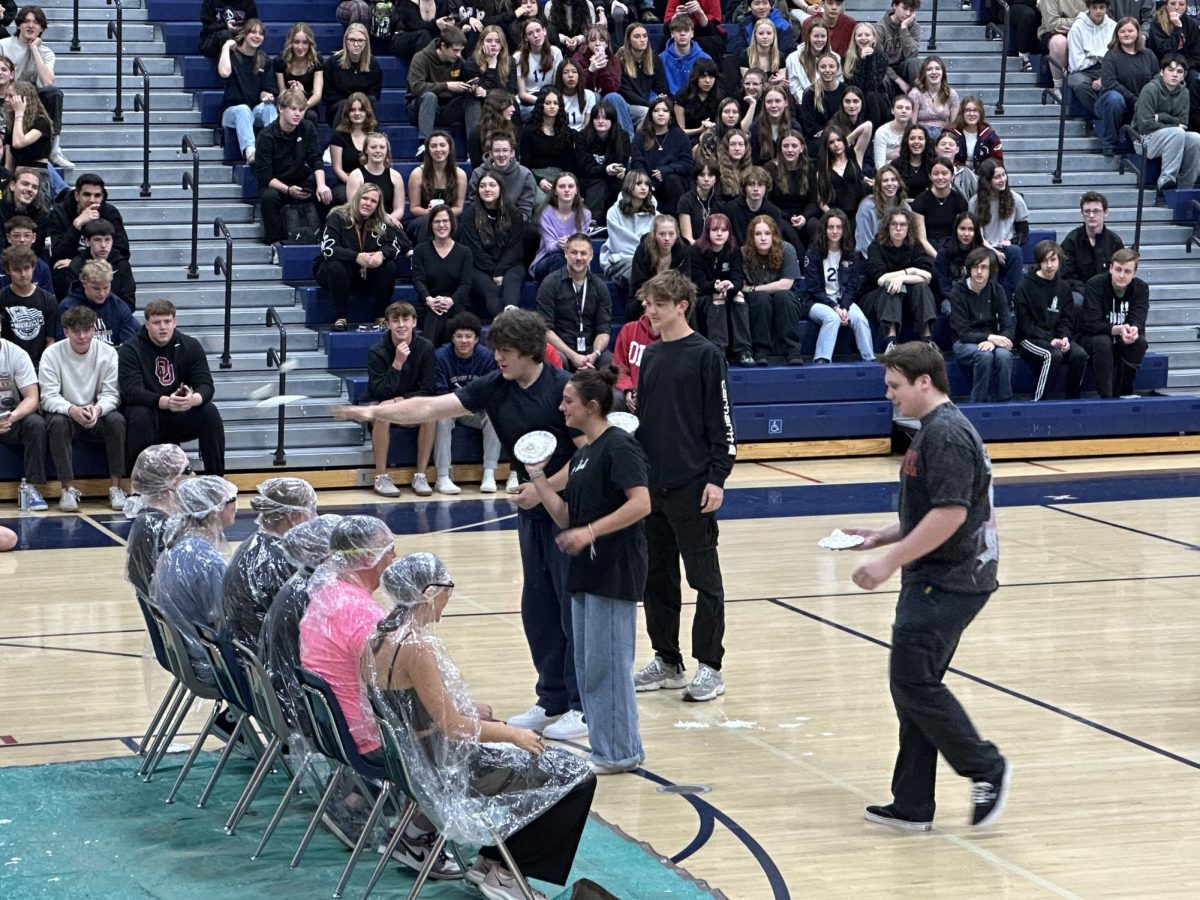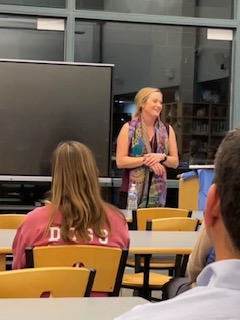
Tracy Dorland, Jefferson County Superintendent, joined the Dakota Ridge and Columbine community to discuss important topics impacting Jefferson County to gather feedback on their approaches. Dorland was joined by Dakota Ridge representative and member of the District Accountability Committee (DAC), Jennifer Miller, for this talk on November 14, 2023.
Dorland has participated in these conversations annually. She holds conversations with different high schools and feeder schools in the Jeffco area. The discussions are aimed at informing parents and school personnel about the district’s approaches to their concerns.
The discussion was split into two sections, one being a facilitated conversation between Dorland and Miller, followed by an open Q&A. Before starting the discussion, Miller announced that the conversation would follow district-based topics rather than individual school or student topics.
The main topics of the discussion between Dorland and Miller revolved around the new schedule changes and school closures and when those would settle’ the mental health and safety of Jeffco students, and the cyber-security incident. Specifically mentioned were the district budget, the demographics of Jefferson County, transportation, and ways to help students with mental health.
Dorland mentions that at this point there will not be any more drastic changes to the school systems.
Since Dorland started as superintendent in 2021, the district has had to shut down many elementary and middle schools. She mentioned that these closures are due to the school’s struggle to maintain attendance and their facilities including before and after school care. Dorland noted how her predecessors followed a “build and they will come” mentality that she believes wasn’t working. The struggle to maintain these schools was that there weren’t as many school-aged children in Jefferson County to fill all the schools, meaning that the number of high school students would drop in the future. Though Dorland stated that she had “no interest to close them.”
The district created a district-wide boundary study in the form of a survey sent to Jeffco families via email to understand why families send their students to one school over the other and to determine where the students are on a map. The information from that survey would be used to create a solution about closing schools.
A temporary solution recently enacted was the combination of Moore Middle School and Pomona High School. The solution was designed by Pomona’s principal after Moore’s administration voiced their concern about the lack of students they had attending. There were around 300 students in a school that held up to eight or nine hundred students, according to Dorland.
In addition to the school closures, Dorland noted that there were a vast number of start and end times between schools which ultimately led to the new schedule designs in the district. Dorland said that she had heard a variety of responses to the change, some in favor and some not. Dorland mentioned that, as a working mom with kids, she understands the frustration and knows that “different families have different needs.” She and the Board of Education are working to find a solution for the issues with start times.
The current issue the district is tackling is transportation, which Dorland believes to be the key to scheduling. There is a shortage of drivers, causing a shortage of buses. One solution they’ve come up with is to raise the wages for the drivers in the hope that more people apply. The schedule for schools’ start and end times takes into account how many students are in need of transportation by bus per grade level. Due to the results, the buses currently start at elementary schools, move to high schools, and then finish with middle schools. Dorland notes that another solution to the schedules, if the transportation situation isn’t fixed, is to start looking towards combining grades on the bus. She wants to know if families are comfortable with middle school and high school students riding the bus together in the mornings before making any decisions. Dorland states her willingness to discuss these topics with families and said they may send another survey out about the start and end times, as well as other time-related topics.
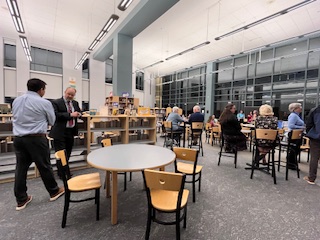
Dorland, along with many district representatives, discussed how to handle the recent increases in behavioral issues they’ve seen. They noted how many teachers have spent a chunk of class time reteaching norms and expectations inside schools: how to behave in hallways/classrooms/lunchrooms and how to interact positively with peers.
The district representatives offered a few solutions for teachers to handle the behavioral issues. They mentioned possibly creating behavior plans that outline how a teacher can effectively handle certain behaviors in schools. Dorland and the district also offered to pay for any teachers who could return to school and get endorsements in special education. Dorland mentioned that there has been a lack of special education teachers recently, as well as school counselors. To attempt to help the number of struggling students, some schools have begun implementing Telehealth, which provides online counseling for those who need it. Parents were also encouraged to reach out to school counselors to learn how they can help their students at home.
During the Q&A section of the conversation, Dorland was asked about the recent cybersecurity incident. A parent at the meeting was concerned about what exactly the individual who committed the crime had obtained, and what the next steps are, specifically whether parents needed to change their passwords as well. Dorland responded by saying that she doesn’t know the exact data/information the “actors” have, but they have investigators working to get that information. Dorland mentioned that the information they release is what they know for certain. All the updates can be found on the Jefferson County Public Schools website.
“I’m really, really sorry we’re going through this,” Dorland said.
Another question involved the HH proposition after the most recent election. The HH proposition, if passed, would’ve reduced property tax rates so the state could spend the revenue it normally returns to residents, creating a cap on the state revenue, distributing the revenue to local governments, and creating a cap on local governments’ property tax revenues. In turn, this would allow state governments to spend more money on education systems.
Dorland stated that she did not believe the HH proposition would pass, and the school systems would not receive the extra funding. According to Ballotpedia, the proposition did not pass.
DRHS principal Kim Keller mentioned that Colorado governments historically have not been spending as much money on their education system in comparison to other states. According to the “U.S. Public Education Spending Statistics”, written by Melanie Hansen with the Education Data Initiative, Colorado is ranked 26th in their average education spending per student.
Dorland noted that the district has struggled with salaries for teachers due to the “flat level funding” provided by the state.
Keller later clarified that Jefferson County had originally used bonds on their buildings to generate money, but this has fallen through with the declining enrollment which is causing the district to attempt to pass a mill levy override. A mill levy override is voter approval to add mills (a factor applied to property value) to a property tax bill. The funding from the override would be directed toward the schools, according to Westminster Public Schools website.
Dorland and Keller stated that Jefferson County is significantly behind their front range peers in terms of funding. Unlike Jefferson County, other districts were successful in passing a mill levy override that accounted for inflation early on. The money that goes into the override does not automatically appear, and so as the money sits, it will eventually decrease in value. For example, if the revenue collected from the override is $10,000 in 2010, it would be about $13,800 today because of the inflation rate per year on the Carbon Collective inflation calculator. Due to Jefferson County not installing the overrides early on, it placed Jeffco below the others and made it difficult for them to catch up. If a mill levy override is passed now, it will place the district in the market for a short period, then the other districts will get more funding, effectively placing Jeffco back where it was: a cycle of moving one step forward, then three steps backward.
Similar to being behind in funding, Jeffco has been behind in performance. Dorland mentioned this during her meeting, and she plans to figure out why Jeffco students are not performing as well as the other peers. Other representatives mentioned their support in comparing the performance in Jefferson county to other counties along the front range, to fully see the differences between them and see what causes said differences.
Dorland does not blame the lack of funding on student performance.
Security throughout Jeffco schools was briefly discussed. The district is trying to ensure that there is ample security for each school in the district. Most high schools have security resource officers, and some middle schools have one or two. Dorland would like to see more officers protecting all middle and high schools, and certain elementary schools. The issue is again with staffing, or the lack thereof, according to Dorland.
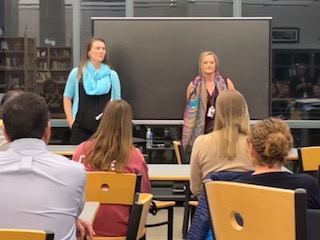
Another member of the audience asked about the autonomy each school has over their curriculum. Dorland restated that when she arrived in office there was minimal consistency in educational practices. She believed that students who had to transfer schools were struggling because of the differences between schooling. This led her to begin creating more standardized systems, including the start and end times, or a “just right balance” between the schools.
Keller provided more detail on the systems, noting that the unorganized curriculums are starting to “streamline.” Keller detailed that the district required consistent math programs across the district a couple of years ago and is currently creating literary programs in English Language Arts classes. If a student transferred schools now, they should be learning with a similar curriculum as before.
To wrap up the conversation, Dorland highlighted the importance she found in talking with the community. She knows that she and the board will be making the decisions, but she says it’s important to her that the community is included/informed on what the decisions are and the changes families will see.
Superintendent Dorland and the other representatives present encourage families to reach out with questions and concerns. The Jeffco Public Schools Website provides the contact information for each member, or the answer could be found on the webpage.
Dorland’s next conversation is on December 4th from 5:30 p.m. to 7:00 p.m. at Pomona High School. Families from the Arvada, Pomona, and Standley Lake areas are encouraged to attend. The schedule for these meetings can be found on the Jeffco web page under Conversations with the Superintendent.



